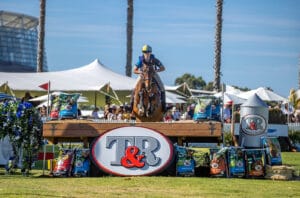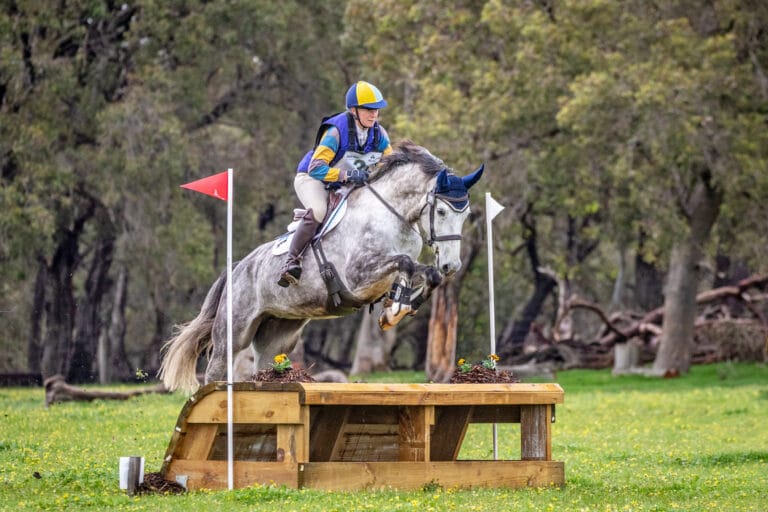Sophie Warren is a professional event rider, horse trainer and coach. She has had many successes at the highest level in eventing, and has been among the top ten at all of Australia’s major competitions.
Q: Was there a horsey background?
A: My mother, who’s from the UK, was very involved in the Pony Club and rode at Olympia. Here she rode side-saddle at various Royals. My aunt did eventing.
Q: Your first competition?
A: I was twelve when I first went eventing and got about a million time penalties on the cross country!
Q: Who did you train with overseas?
A: Hermann Burger at Stall Ramsbrock in Germany. There I worked three-year-olds to GP dressage and jumping horses. I also spent time in the UK with Francis Whittington, one of the world’s best cross country riders.
Q: Tell us about Horses Hate Surprise Parties.
A: Portland Jones and I wanted to help disseminate the abundant information about equitation science to the wider community. Our book, now in its third print run, is about how horses learn. It’s a practical training guide and includes lots of fun exercises.
Q: Did you go to university?
A: I was to study Agriculture or Landscape Architecture. My very supportive parents agreed to my having a gap year, then I deferred for another year and then another. By then I’d competed in the Trans-Tasman and was coaching and riding full time. Uni never got another look in!
Q: Tell us about your Highfield Academy.
A: I want to enhance horse welfare and rider safety. The more people I can train, then the more riders have a deep understanding of good training practices, and the more horses I can help indirectly.
Q: Do you have help?
A: I’ve a dedicated team who help get all the horses worked during the week. We assist each other at competitions.
Q: An average working day?
A: If possible we don’t start overly early. Eventers and foundation trainers are worked in the morning then I start teaching. When there’s time I do some admin or property maintenance.
Q: What do you look for in a horse?
A: A good mind and quick legs! If they have great conformation and scope but are super hot or super dull it’s a battle from the start. For eventing they need to have quick legs, a sound build, and a good mind for the job.

With Hazid Road at Equestrian in the Park (Image by Eric Lloyd Photography)
Q: Why have you trained elephants and camels?
A: Dr Andrew McLean got into elephant training years ago and eventually a charity was created and I began learning with that charity. Camel training happened when I was approached to work with wild captured camels and a blind man named Max. Since then Max has developed a thriving dairy and produces cosmetics. It’s great seeing some of WA’s feral camels being repurposed.
Q: How different are the methods?
A: The same! Training comes down to understanding what cognitive abilities the animal has, how they can learn and their ethology. If you know about learning theory and can discover these two things you can train almost anything.
Q: Have your training abilities taken you into other areas of work?
A: My understanding of equitation science has led me to being involved in writing curriculum (such as Pony Club Australia’s re-write in 2020) and taken me all around South-East Asia.
Q: Which horse has taught you the most so far?
A: Let’s Impress, who’s living out his retirement here at Highfield.
Q: What did you learn from him?
A: He took me to a CCI5*and we represented Australia. He taught me to be brave and how to jump the really big fences – well, we taught each other that bit! Eminence was another incredible learning horse, who initially was very strong cross country. I taught him to go in a bitless bridle and in the end I rode him in the bitless around CCI4* tracks with success. For cross country we must have a bit, so I had to get good at riding with two reins but the more I relied on the bitless, rather than the bit, the better he’d go. It was a great learning journey and I have used it to rehab many horses’ mouths since then.
Q: What’s the most important trait to have when teaching?
A: Teaching’s a huge amount about listening, and a lot about investigating. Listen to what a rider perceives their main problems are, ask questions to find out which part of the training they’re having trouble with, and listen again to know that they’ve understood what you’ve taught them.
Q: You’ve driven to east coast events across the Nullarbor.
A: So far I’ve driven across the desert 19 times! You must keep driving and get the horses to their next stop for their welfare. It’s a long trip but, much like when we camp at the local shows, it’s a fun thing to experience with your horse.
Q: Your greatest success?
A: Competing for Australia, but also winning a long format. In 2010 I won both the CCI*-L and the CCI4*-L at Wooroloo International on horses I’d produced. Last year I won the CCI2*-L at WAYER International Horse Trials. Any long format win is something to be cherished – you don’t get to do it often!
Q: Do you have any superstitions prior to a competition?
A: No
Q: Do you eat fast food or healthy at competitions?
A: Healthy! One of our team is a very good cook so the food’s planned in advance. I must admit I usually stick to Sustagen pre-cross country, with a quick chocolate break between rounds when I’ve got a fast turnaround. Other than that it’s a pretty healthy menu.
Q: At 33 you seem to be firmly grounded – any regrets?
A: You only regret the chances you didn’t take, and I haven’t passed up many opportunities to do interesting or challenging things in my life so far!
5 Extra Questions
Q: Your biggest challenge?
A: In 2018 I lost my two best horses at the time, both in traumatic circumstances and only months apart. Then I hurt my back which eventually required surgery. I’ve had injuries, and I’ve had horses with injuries and I’m no stranger to rehab, but when you lose the best horses on your team (and your best friends), AND have no certainty you’ll be able to ride competitively in the future … that’s a tough space.
Q: What one piece of tack or equipment couldn’t you live without?
A: My bitless bridles. I love working the horses bitless and testing their responses and self-carriage. It’s also great for hack out days or retraining horses with any serious stop button issues.
Q: What is your go-to riding exercise?
A: It’s all about stop, go and turn. So you’ll often find me doing up and down transitions on a square.
Q: Any other exercise or workouts other than riding?
A: Resistance training and Pilates or yoga help me stay fit and sound.
Q: Do you have other interests apart from equestrian?
A: Too many to list! I love to fly performance kites, mountain bike in the hills, keep bees, play tennis, surfski … basically I tend to enjoy anything that is outdoors and requires quick reactions.
Interested in Sophie’s book Horses Hate Surprise Parties? Order a copy: www.sophiewarren.com.au
Feature image: Kinnordy Gigi’s daughter Generosty (by Kannan) in her first eventing start at the 2021 Alcoa International Horse Trials (Image by Wayne Edwards, Waylib Photos).



